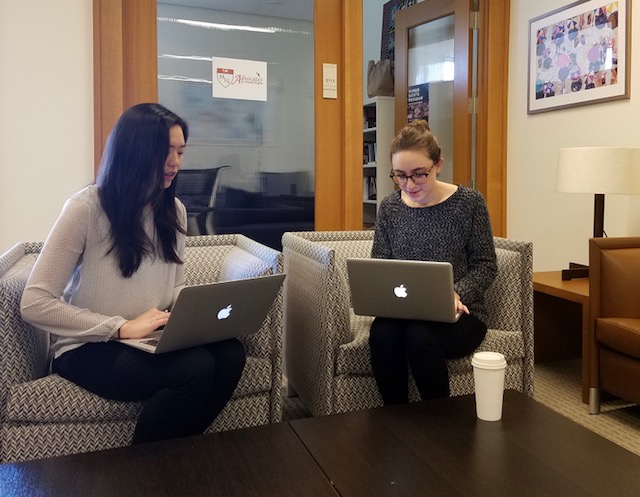
Posted by Marissa Yu, JD ’17, and Zoe Egelman, JD ’18
Earlier this week, the Harvard Immigration and Refugee Clinical Program (HIRC) co-authored a brief to the Board of Immigration Appeals (BIA) on the “material support” bar to asylum, arguing that the word “material” must be given independent meaning in order to ensure that victims of terrorism are not unfairly denied humanitarian protection.
The material support bar in the Immigration and Nationality Act (INA) prevents individuals who have afforded “material support” to terrorist activity or foreign terrorist organizations from obtaining asylum.
Over the past several years, federal courts of appeals have asked the BIA to clarify how much support triggers the bar. Is “material support” a term of art that includes any amount of support, even de minimis contributions to foreign terrorist organizations? Or does “material” have independent meaning such that de minimis contributions will not trigger the bar? To resolve this issue, the BIA issued a call for amicus.
HIRC took the call to advocate for asylum seekers unjustly affected by the failure to give meaning to the “materiality” requirement of the bar. These include innocent civilians who give minimal amounts of good or services to rebel or terrorist groups that they dislike or fear but with which they are obligated to interact on a regular basis because the conditions in their home countries offer them no realistic alternative. They also include refugees who have limited dealings with groups they see as their protectors against more abusive, typically governmental, forces, and to which they make contributions that can hardly be considered criminal acts.
Together with the Immigrant Rights Clinic at Texas A & M University School of Law, HIRC filed the brief on behalf of Human Rights First, which issued a comprehensive report in 2006 documenting the harsh consequences of an overly broad material support bar.
The brief makes several arguments as to why the word “material” must be construed narrowly.
First, a failure to give proper weight to the word “material” would violate the Refugee Act of 1980 and fly in the face of the United States’ international obligations. A driving principle of the international Refugee Convention is non-refoulement, the duty not to expel or return (refouler) refugees to their home countries where their lives or freedom would be threatened. In order to avoid the grave consequences of return, U.S. and international law require exclusions from refugee protection to be construed narrowly. A broad reading of the material support bar would undermine that obligation.
Moreover, failing to give “material” independent meaning has already unjustly denied protection to victims of terrorism who have been forced to give minimal goods or services to rebel or terrorist groups out of fear or during unavoidable daily activities. Prior BIA decisions hold that duress is not a defense to the material support bar, further exacerbating the injustice that the bar can cause.
Ultimately, the brief argues that a better approach would be to consider the totality of the asylum applicant’s circumstances. Taking into account factors such as individual culpability, the extent of the support, and the nature of activities committed by the terrorist organization would ensure that the material support bar is only applied to individuals who truly pose a danger to the security of the United States, which, after all, is the ultimate purpose of the bar.
This is the second amicus brief on bars to asylum that HIRC has submitted to the BIA this academic year. In November of 2016, HIRC co-authored a brief on behalf of eight renowned scholars of international refugee law as amici curiae in the case of Negusie v. Holder, which the U.S. Supreme Court remanded to the BIA in 2009.
Negusie concerned an Eritrean citizen who, after refusing to fight against Ethiopia, was incarcerated by the Eritrean government and was coerced, as part of his punishment, into guarding prisoners who were themselves victims of persecution. Given the “persecutor bar” in the INA, which excludes from refugee protection an individual who assists or participates in persecution of another person in her home country, the Supreme Court asked the BIA to decide whether an asylum applicant can plead duress as a defense to this bar, or whether the bar makes no exception for involuntariness.
HIRC had submitted an amicus brief on a similar subject to the Supreme Court in 2008, also on behalf of scholars of international refugee law, asserting that a duress defense is necessary to comply with our international obligations under the Refugee Convention. In a dissenting opinion, Justices Stephens and Breyer agreed with many of the arguments in HIRC’s brief, citing to numerous sources of international and foreign law that HIRC had used to support its arguments.
In last November’s brief to the BIA, HIRC drew on historical and international legal sources to demonstrate that the drafters of the Refugee Convention, the origin of the persecutor bar, contemplated a duress defense. The Clinic also examined case law from other States parties to the Refugee Convention, including Canada, Australia, the United Kingdom, New Zealand, and the European Union, that recognize a duress defense.
The brief went on to propose a comprehensive test for the duress defense grounded in history and international law, where an asylum applicant should not be subject to the persecutor bar in cases where the acts charged are a result of threat of imminent death or of continuing or imminent serious bodily harm; were reasonable and necessary to avoid the threat; and were not intended to cause greater harm than that threatened.
HIRC argued that, similar to the material support bar, the persecutor bar must not be used to exclude victims of persecution in need of humanitarian protection, but rather only individuals guilty of egregious international crimes.